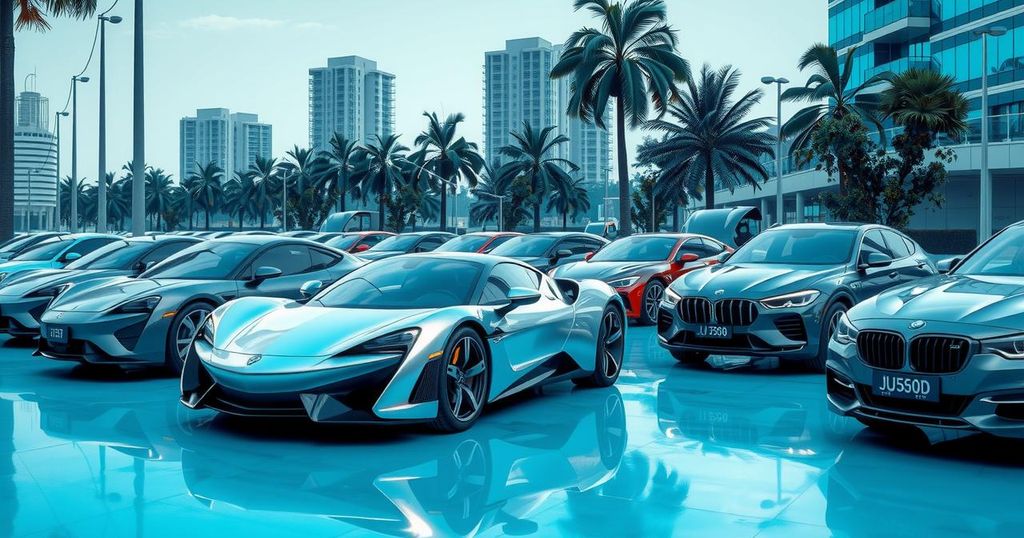Cars
AION, ASIA, AUTOMOTIVE INDUSTRY, BAIC, BMI RESEARCH, BYD, CHANGAN, CHERY, CHINA, DFSK, EUROPE, EXPORTS, FITCH SOLUTIONS, FOREIGN INVESTMENT, GEELY, GERMANY, GOLDMAN SACHS, GREAT WALL MOTORS, HONRI, HYUNDAI, INDONESIA, INTERNATIONAL TRADE, INVESTMENTS, JAKARTA, KOKETSO TSOAI, MEXICO, NETA, NORTH AMERICA, QJ MOTOR, SAIC MOTOR, SOUTH CHINA MORNING POST, WULING, XPENG
Lena Nguyen
0 Comments
Chinese Automakers Expand into Indonesia’s Market Amid Intense Competition
Chinese car brands are increasingly entering the Indonesian auto market, breaking the dominance of Japanese and South Korean manufacturers by offering affordable and feature-rich electric vehicles. Despite slumping new car sales overall, these companies are drawn to Indonesia’s market due to competitive pressures at home and favorable tax incentives. Government efforts are pushing for local production and investments, even as challenges to consumer perception and dealership networks persist.
Chinese car manufacturers have made significant inroads into the Indonesian auto market over the past three years by introducing affordable electric vehicles (EVs). This emergence has led to a decrease in the dominance previously held by Japanese and South Korean brands. Despite a general decline in new car sales within Indonesia, these automakers are attracted to the market due to fierce competition in China as well as tax incentives that Indonesia offers on imported vehicles.
In its 2023 report, SAIC Motor noted that the competitive landscape has led to unprecedented price wars, particularly among EVs, with a reported average price decrease of 10 percent in December alone. Consequently, SAIC Motor lost its status as Indonesia’s top car seller to BYD, amidst pressures from excess manufacturing capacity, as Chinese manufacturers heavily depend on exports for sustainability.
Goldman Sachs has projected that Chinese EV manufacturers possess a production capacity of around 20 million units per year, although only 11 million units were sold domestically last year. Additionally, China’s automotive exports surged more than threefold since 2021, totaling approximately six million units, which enabled the country to become the world’s largest car exporter.
The inflow of Chinese car brands has expanded due to the arrival of new players such as Changan, Honri, Xpeng, Geely, and QJ Motor, all of which have either initiated operations in Indonesia or are in the process of establishing factories. However, many of these brands still rely on completely built-up (CBU) imports for a significant portion of their vehicles sold in the country.
Analyst Koketso Tsoai from Fitch Solutions has remarked that Chinese automakers are appealing to Indonesian consumers with technologically advanced vehicles offered at competitive prices. As a case in point, Wuling has effectively taken market share from brands such as Hyundai. This trend is further supported by government incentives and subsidies aimed at boosting local EV production, which provide various tax breaks for vehicles with locally sourced components.
Despite the growing interest, industry expert Roshan Raj from Redseer cautioned that the influx of Chinese EVs may not substantially impact overall new car sales in Indonesia, which fell by 13.9 percent year-on-year to 865,000 units last year, owing to prevailing economic challenges. Remarkably, Chinese companies raised their market share from 3.4 percent in 2021 to 6.4 percent in the previous year, while Japanese brands experienced a decline from 95 percent to 89.3 percent in the same timeframe.
Concerns have also been raised regarding the introduction of Chinese EVs impacting local producers such as Hyundai. Deputy Chairman of the House of Representatives, Lamhot Sinaga, expressed that the competitiveness of Hyundai had been compromised by an influx of imports, reducing its local plant utilization by 30 percent since 2022. In response, Industry Minister Agus Gumiwang Kartasasmita urged automakers to prioritize local production and investments in Indonesia.
Automotive analyst Yannes Martinus Pasaribu noted that while Chinese brands have long-term strategies to establish manufacturing facilities and local supply chains, challenges remain, particularly with establishing dealership networks and improving consumer perception, which still poses hurdles for these brands in Indonesia.
The expansion of Chinese automotive brands into the Indonesian market signifies a transformative shift within the industry, challenging the long-standing dominance of Japanese and South Korean vehicles. While attractive pricing and technological features are appealing to consumers, economic uncertainties and market conditions present ongoing challenges for both Chinese producers and local manufacturers. As the competition intensifies, it remains crucial for all players to focus on local production capabilities and enhancing consumer perceptions to ensure market sustainability.
Original Source: www.thestar.com.my




Post Comment